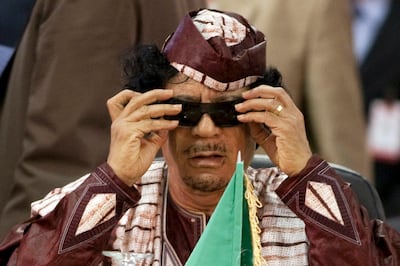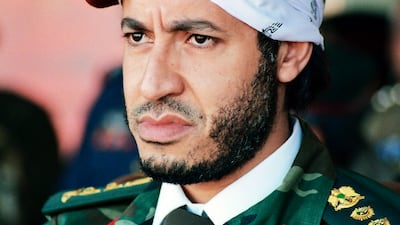Libyan authorities on Sunday released one of Muammar Qaddafi’s sons after more than seven years of detention in the capital of Tripoli after his extradition from neighbouring Niger, the country’s interim leader said.
Prime minister-designate Abdul Hamid Dbeibah said in a tweet early on Monday that Al Saadi Qaddafi had been released in compliance with a previous court order.
Mohamed Hamouda, a spokesman for the transitional government, said Qaddafi walked free from Tripoli’s Al Hadaba prison, where many Qaddafi regime officials are being held pending trial, mostly in connection to the crackdown on the 2011 uprising that toppled the longtime ruler and led to his killing.
Mr Hamouda did not elaborate on the circumstances of the son’s release.
Local media reported Al Saadi Qaddafi was released after he was acquitted on charges dating to the uprising against his father’s rule.
After his release, he travelled to Turkey, Al Marsad news website reported.
“We cannot move forward without achieving reconciliation,” Mr Dbeibah said in the tweet announcing the release.
His government has been given the task of leading the war-racked country to elections before the end of this year.
At the time of the 2011 revolt, Al Saadi Qaddafi led a special forces brigade that was involved in the crackdown on protesters and rebels.
He was smuggled across the desert to Niger in 2011 just as his father’s regime was crumbling.
He was extradited in March 2014 after he, and colleagues who accompanied him, “failed to respect the conditions of his stay in Niger", the West African nation’s government said at the time.
The dictator had eight children, most of whom played significant roles in his regime.
His son Muatassim was killed at the same time Qaddafi was captured and slain. Two other sons, Saif Al Arab and Khamis, were killed earlier in the uprising.

Saif Al Islam, the one-time heir apparent to his father, has been in Libya since his release from detention in 2017. Another son, Hannibal, is reportedly detained in Lebanon.
The rest of the children are still at large having sought asylum in neighbouring Algeria along with Qaddafi’s wife and Al Saadi’s mother, Safiya.
The mother, a sister and two brothers were granted asylum in Oman in 2012 and moved there from Algeria.
During his father’s rule, Al Saadi Qaddafi was known for his lavish lifestyle and he treated Libya’s soccer league as his personal fiefdom.
He played for several Libyan teams and for an Italian club until he failed a drug test. At various times, he led Libya’s soccer federation and its national team.
In one case, security forces opened fire on fans at a 1996 match attended by Al Saadi, killing people in murky circumstances.
He is also suspected in the 2005 killing of Bashir Al Riyani, a popular Libyan soccer player who was a vocal critic of Qaddafi’s regime.
After his extradition, prosecutors in Libya said Al Saadi faced charges in connection to abductions and rapes during the 2011 uprising, misuse of his post and the killing of Al Riyani.
The elder Qaddafi ruled Libya with an eccentric brutality for nearly 42 years before he was ousted by an uprising in August 2011. He was captured and killed two months later.
The oil-rich country plunged into chaos after the uprising and has been ruled for most of the past decade by rival governments based in Libya’s west and the east, each backed by armed groups and foreign governments.

